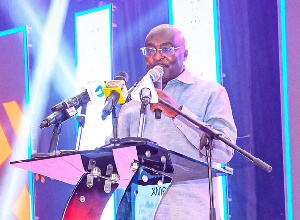- Home - News
- Polls
- Year In Review
- News Archive
- Crime & Punishment
- Politics
- Regional
- Editorial
- Health
- Ghanaians Abroad
- Tabloid
- Africa
- Religion
- Election 2020
- Coronavirus
- Photo Archives
- News Headlines
- Press Release
Health News of Friday, 19 December 2014
Source: GNA
‘Let's get involved in Ebola/cholera campaign’
Ghanaians have been urged to be actively involved in the Ebola and cholera sensitisation campaign to prevent the spread of those diseases in the country.
Mr Charles Kottey, Director of the Greater Accra Regional Co-ordinating Council, made the call at a stakeholders meeting organised by the Hope for Future Generation (HFFG), a non-governmental organisation (NGO).
The meeting, on the theme: “Ebola and Cholera are Preventable - Play Your Part!” was attended by traditional and religious leaders and representatives of various institutions.
They deliberated on issues pertaining to the prevention of the diseases and charted the way forward.
The HFFG is undertaking a six-month National Ebola and Cholera Behavioral Change Communication Project in Volta, Greater Accra, Western and Brong Ahafo regions.
It is being funded by UKaid, a British organisation, while the Ghana Health Service is implementing the programmes through HFFG, Youth Development, Research and Innovation Centre and the Institute of Social Research and Development.
Mr Kottey, who chaired the function, said Ghanaians should avoid being complacent that the Ebola viral disease had not yet gotten to Ghana so they would not pay serious attention to it.
“Let us start the Ebola and cholera education from our families and then to the public so that we will not be taken unaware,” he said.
He asked the people to co-operate with civil society organisations to help propagate the message of hygiene and proper sanitation practices to avoid diseases.
He expressed gratitude to HFFG and the sponsors and gave the assurance that the RCC would partner them to carry the sanitation awareness to the nooks and crannies of the regions.
Mr Sam Benefour, Programmes Director of HFFG, speaking on behalf of the Executive Director, said the work of behavioural change in hygiene and sanitation could not be done by the NGO alone.
He called on traditional and religious leaders and heads of institutions to be part of the education on Ebola, cholera and sanitation.
Mr Benefour said 93 community surveillance volunteers had been recruited to undertake house-to-house education and had so far sensitised about 60 households on hygiene and sanitation since the project started a month ago.
He said the project had envisaged to make 70 per cent “at risk groups” knowledgeable about Ebola and cholera on the mode of transmission, signs and symptoms and the ways of preventing them.
Mr Benefour urged opinion leaders to package their messages in a way that would not put fear and panic into the people when educating them on Ebola.
The participants, during an open forum, urged the Ghana Immigration Service to tighten its screening at the borders to prevent the Ebola disease from spreading to the country.
The HFFG is a non-profit organisation established in 2001 and has been operating in areas of women and children, youth, TB/HIV and malaria prevention among other things. It is currently embarking on a six-month awareness creation project on Ebola and cholera.











